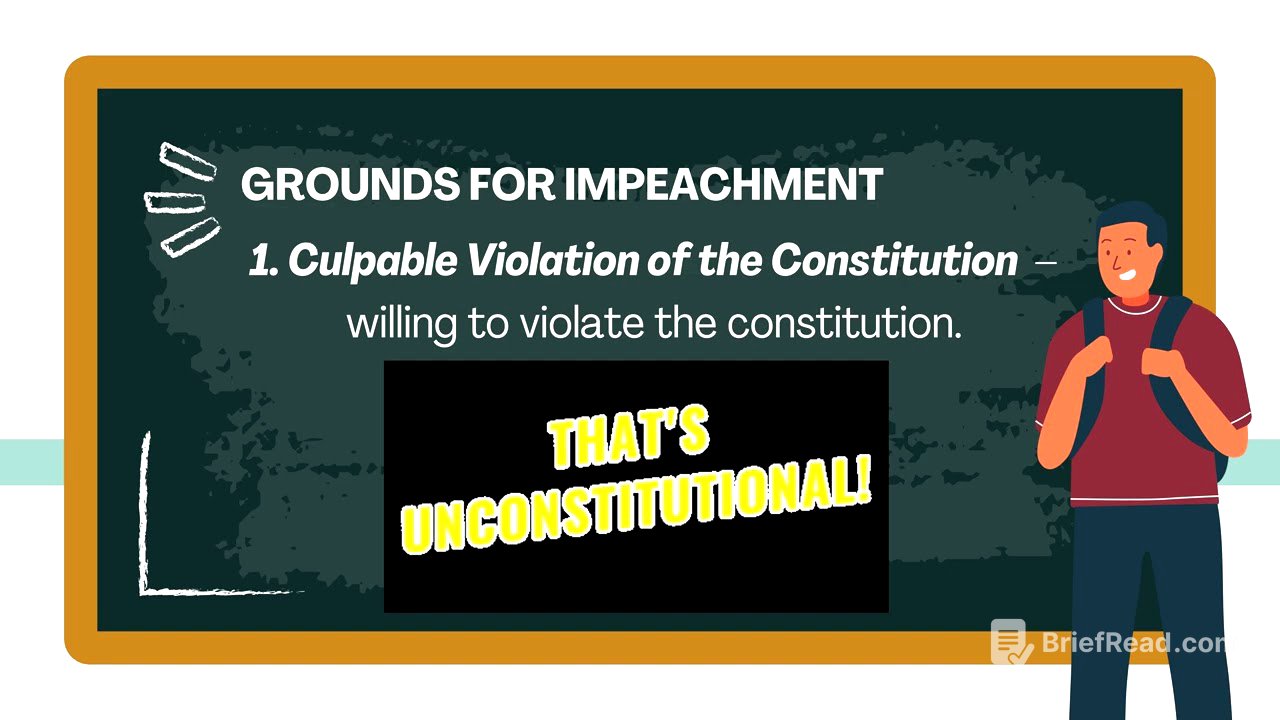TLDR;
This video provides an overview of Article 11, focusing on the accountability of public officers in the Philippines. It defines public office, discusses its nature, and explains the process of impeachment, including grounds, procedures, and penalties. Additionally, it details the role, composition, appointment, and qualifications of the Ombudsman.
- Public office entails rights, responsibilities, and authority conferred by law, requiring service to the public.
- Impeachment is a legal process to investigate and remove high-ranking officials for offenses like violating the constitution or betraying public trust.
- The Ombudsman, or Tanodbayan, acts as a watchdog of government offices, investigating complaints against officials and suggesting solutions.
Definition and Nature of Public Office [0:07]
A public office is defined as a right, authority, and duty created by law, associated with positions in government. Public office is a public trust, requiring those in office to serve the public and provide services for the benefit of the people. A public office is not considered personal property, and removal from office should not result in claims against the government for damages. Public office is not a contract.
Impeachment: Definition, Officials, and Grounds [1:41]
Impeachment is a method of national inquest into the conduct of public officials to ensure transparency, accountability, and integrity. Officials who can be removed through impeachment include the President, Vice President, members of the Supreme Court, members of constitutional commissions, and the Ombudsman. Grounds for impeachment are culpable violation of the constitution, treason, bribery, betrayal of public trust, and other high crimes. Culpable violation involves intentional disobedience of the constitution. Treason involves giving support to foreign powers. Bribery is accepting gifts to influence decisions. Betrayal of public trust involves violating duties, and other high crimes include abuse of power and obstruction of justice.
Impeachment Trial: Steps and Penalties [4:30]
The impeachment process begins with the filing of a complaint in the House of Representatives, requiring a 1/3 vote of the members for approval. The impeachment trial is then held in the Senate, requiring a 2/3 vote of the senators to decide the outcome. Penalties for impeachment include removal from office and disqualification from holding any office in the Republic of the Philippines.
The Ombudsman: Role and Composition [5:35]
The Ombudsman, also known as the Tanodbayan, serves as the watchdog of government offices and agencies. The Ombudsman investigates complaints against government officials and suggests solutions, presenting evidence and arguments to address violations. The composition of the Ombudsman includes one overall deputy ombudsman, one deputy ombudsman for each of the three major islands (Luzon, Visayas, and Mindanao), and one deputy ombudsman for the AFP and law enforcement agencies.
Appointment, Term, and Qualifications of the Ombudsman [7:07]
For the appointment of the Ombudsman, the Judicial and Bar Council must pass a list of at least six candidates to the President. The term of office is seven years without reappointment, and confirmation from the Commission on Appointments is not required. Qualifications for becoming the Ombudsman include being a natural-born citizen of the Philippines, being at least 40 years old at the time of appointment, being a member of the Philippine Bar, and having recognized probity and independence.







![‘세계 최초 금지법’까지 만들었는데...왜 미국·유럽처럼 안 바뀌는 거죠? [뉴스 쉽게보기]](https://wm-img.halpindev.com/p-briefread_c-10_b-10/urlb/aHR0cHM6Ly9pbWduZXdzLnBzdGF0aWMubmV0L2ltYWdlLzAwOS8yMDI1LzA5LzIxLzAwMDU1NjIxMzJfMDAxXzIwMjUwOTIxMTM1NDA3MjMyLnBuZz90eXBlPXc4MDA=.jpg)

